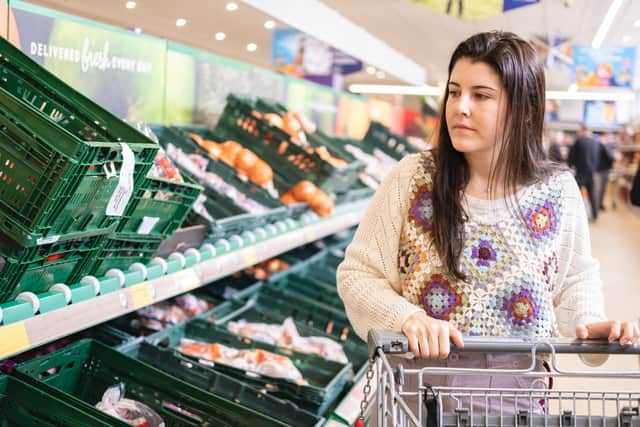UK food price inflation ‘may be peaking’ at supermarkets as energy prices fall, British Retail Consortium says
and live on Freeview channel 276
The rate of food price hikes slowed down in May after falling energy prices and commodity costs began to filter through to consumers, retailer trade body the British Retail Consortium (BRC) has found.
According to its latest monthly Shop Price Index, which it publishes in conjunction with data analysts NielsenIQ, overall food inflation sat at 15.4% between 1 and 7 May - down from 15.7% the previous month. Within this statistic, the rate of hikes for fresh food remained higher at 17.2%, but had itself decelerated from April’s rate of 17.8%.
The figures come just under a week after official inflation data showed the rate of price rises had fallen considerably, albeit by not as much as economists had anticipated. The headline rate of the Consumer Prices Index (CPI) in April 2023 was 8.7% - well below the 10.1% seen in March. The rate for food fell slightly, but still remained close to a 45-year high at 19.3%.
It all means prices are still rising rapidly, which in turn means the cost of living crisis is likely to be getting worse. The Bank of England also looks set to hike interest rates in light of the news, with mortgage payers already facing a spike in costs ahead of the central bank’s June announcement.
In a bid to tackle the situation, the government is reportedly planning to implement a food price cap in supermarkets. But NationalWorld analysis suggests such a policy may not be the quick fix the Rishi Sunak administration thinks it will be.
Food inflation down but shop price hikes up
According to the latest BRC-NielsenIQ calculations, people in the UK faced food price inflation of 15.4% in the first calendar week of May. In practice, the figures mean a food item that cost £1 a year ago is now an average of 15p more expensive.
Fresh food led the way, with prices running at 17.2% - 0.6 percentage points below April’s figure. Ambient food price hikes (i.e. anything you find outside of supermarket fridge or freezer aisles) accelerated from 12.9% to 13.1% month-on-month - the fastest rate in the category on record.


Overall shop price inflation, including non-food products, climbed from 8.8% to 9% between April and May. The BRC said this figure was also a record high. But the trade body sounded a positive note about the statistics. BRC chief executive Helen Dickinson said there were signs that we could soon see price inflation decelerate in stores.
Lower energy and commodity prices ‘pushing inflation down’
Ms Dickinson said: “While overall shop price inflation rose slightly in May, households will welcome food inflation beginning to fall. The slowdown in inflation was largely driven by lower energy and commodity costs starting to filter through to lower prices of some staples including butter, milk, fruit and fish.
“Conversely, the price of chocolate and coffee rose off the back of the ongoing high global costs for these commodities. While non-food inflation rose, consumers are benefitting from heavy discounts in footwear as well as books and home entertainment.”
Ms Dickinson added that “fierce competition” among supermarkets was keeping British food “among the cheapest” available amongst comparable European economies. She said food inflation “might be peaking” but warned the government against any moves that could damage the sector’s efforts.
“It is vital that government does not hamper this early progress by piling more costs onto retailers and forcing up the cost of goods even further. The biggest risk comes from policies such as the incoming border checks and reforms to packaging recycling fees,” the BRC chief said.
It comes as the government is mooting the implementation of a food price cap in supermarkets. The UK currently has the highest CPI rate among comparable economies and is also seeing the worst rate of food inflation in Western Europe.
The government appears to be viewing the cap as a way to cut shelf prices for staple items to the extent that general price rises will decelerate faster. But a similar policy in France has failed to lower inflation during its first month of operation, suggesting the policy may not be a quick fix.
Comment Guidelines
National World encourages reader discussion on our stories. User feedback, insights and back-and-forth exchanges add a rich layer of context to reporting. Please review our Community Guidelines before commenting.
